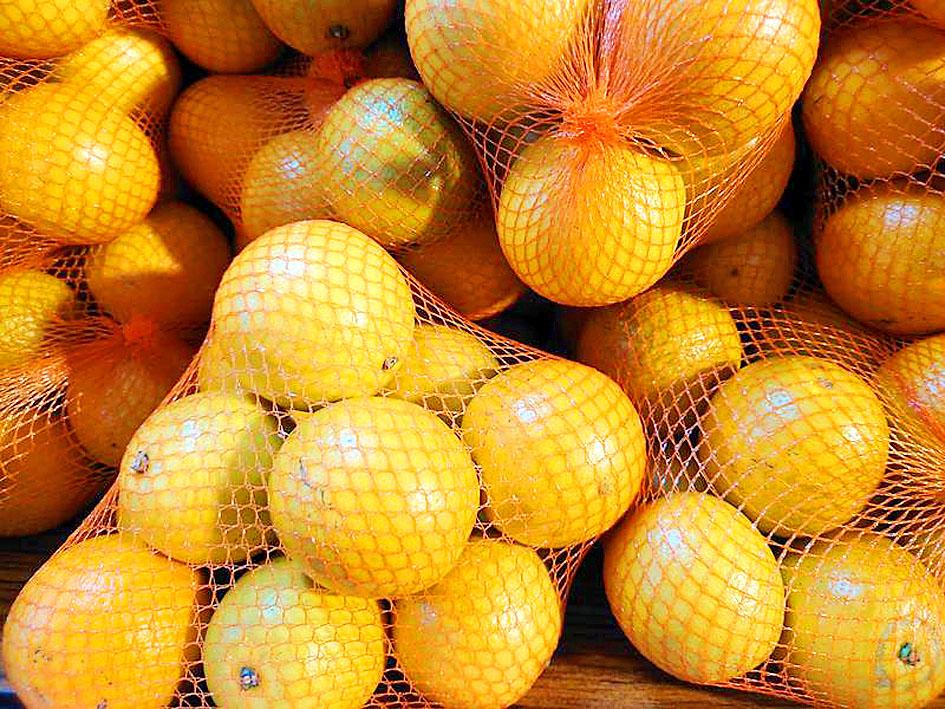The government should prepare contingency plans for a possible Chinese ban on oranges from Taiwan, Democratic Progressive Party (DPP) Legislator Lai Hui-yuan (賴惠員) said yesterday.
Beijing on Monday suspended imports of custard apples and wax apples from Taiwan, citing mealybug infestations in shipments on “multiple occasions” this year.
Lai, who represents Tainan, a major fruit-growing area, said that the Council of Agriculture and Tainan Mayor Huang Wei-che (黃偉哲) must start planning a response to such a ban and not wait until after one has already happened.

Photo: Taipei Times file
More restrictions by China would hurt Tainan growers, who are already suffering from the effects of water shortages this year, she said.
The mayor should help growers find alternative buyers to diversify the export market, she said.
China’s actions might put more than citrus growers at risk and the council should start a comprehensive review of produce that might be threatened this year, she said.
Tainan is the nation’s biggest orange-producing region, with 1,764 hectares in Dongshan (東山), Baihe (白河) and Lioujia (六甲) districts producing 60,000 tonnes of the fruit per year, she said.
China accounts for 95 percent of Tainan’s orange exports, or 0.5 percent of the overall yield, Lai said.
The special municipality is also the third-biggest producer of ponkans, with 902 hectares in Dongshan and Baihe yielding 27,233 tonnes of the citrus fruit per year, she said.
Tainan’s specialty ponkan, the green-skinned honey orange, is mainly cultivated for the domestic market, but it has been hit hard by the water shortages, she said.
Beijing’s announcement on Sunday of the ban was the second time this year that China has suspended imports of fruits from Taiwan.
In February, China banned imports of pineapples from Taiwan, citing “harmful creatures” that could arrive with the fruit.
Taiwan had said there was nothing wrong with the pineapples and accused Beijing of playing politics.
Additional reporting by Reuters

An undersea cable to Penghu County has been severed, the Ministry of Digital Affairs said today, with a Chinese-funded ship suspected of being responsible. It comes just a month after a Chinese ship was suspected of severing an undersea cable north of Keelung Harbor. The National Communications and Cyber Security Center received a report at 3:03am today from Chunghwa Telecom that the No. 3 cable from Taiwan to Penghu was severed 14.7km off the coast of Tainan, the Ministry of Digital Affairs said. The Coast Guard Administration (CGA) upon receiving a report from Chunghwa Telecom began to monitor the Togolese-flagged Hong Tai (宏泰)

A cat named Mikan (蜜柑) has brought in revenue of more than NT$10 million (US$305,390) for the Kaohsiung MRT last year. Mikan, born on April 4, 2020, was a stray cat before being adopted by personnel of Kaohsiung MRT’s Ciaotou Sugar Refinery Station. Mikan was named after a Japanese term for mandarin orange due to his color and because he looks like an orange when curled up. He was named “station master” of Ciaotou Sugar Refinery Station in September 2020, and has since become famous. With Kaohsiung MRT’s branding, along with the release of a set of cultural and creative products, station master Mikan

RISING TOURISM: A survey showed that tourist visits increased by 35 percent last year, while newly created attractions contributed almost half of the growth Changhua County’s Lukang Old Street (鹿港老街) and its surrounding historical area clinched first place among Taiwan’s most successful tourist attractions last year, while no location in eastern Taiwan achieved a spot in the top 20 list, the Tourism Administration said. The listing was created by the Tourism Administration’s Forward-looking Tourism Policy Research office. Last year, the Lukang Old Street and its surrounding area had 17.3 million visitors, more than the 16 million visitors for the Wenhua Road Night Market (文化路夜市) in Chiayi City and 14.5 million visitors at Tainan’s Anping (安平) historical area, it said. The Taipei 101 skyscraper and its environs —

Taiwan on Friday said a New Zealand hamburger restaurant has apologized for a racist remark to a Taiwanese customer after reports that it had first apologized to China sparked outrage in Taiwan. An image posted on Threads by a Taiwanese who ate at Fergburger in Queenstown showed that their receipt dated Sunday last week included the words “Ching Chang,” a racial slur. The Chinese Consulate-General in Christchurch in a statement on Thursday said it had received and accepted an apology from the restaurant over the incident. The comment triggered an online furor among Taiwanese who saw it as an insult to the